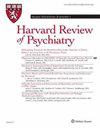Does Hippocampal Volume in Patients with Posttraumatic Stress Disorder Vary by Trauma Type?
IF 2.5
4区 医学
Q2 PSYCHIATRY
引用次数: 4
Abstract
Abstract Posttraumatic stress disorder (PTSD) is a debilitating disorder that can develop after experiencing a traumatic event and is, in part, characterized by memory disturbances. Given its important role in learning and memory, the hippocampus has been studied extensively in PTSD using volumetric neuroimaging techniques. However, the results of these studies are mixed. The variability in findings across studies could arise from differences in samples with regard to trauma type, but this connection has not yet been formally assessed. To assess this question, we conducted (1) mixed-effects meta-analyses to replicate previous meta-analytic findings of significant differences in hippocampal volumes in PTSD groups versus two different types of control groups (trauma-exposed and -unexposed groups), and (2) mixed-effects subgroup and meta-regression analyses to determine whether trauma type moderated these hippocampal volume differences. Overall, the PTSD groups showed significantly smaller right hippocampal volumes than both control groups and significantly smaller left hippocampal volumes than trauma-unexposed control groups. Subgroup and meta-regression analyses revealed that trauma type did not moderate the effect seen between PTSD and trauma-exposed non-PTSD groups but did moderate the effect between the PTSD and trauma-unexposed control groups: studies that contained participants with PTSD related to combat trauma exhibited significantly smaller effect sizes for right hippocampal volumes compared to the interpersonal violence and “other” trauma-type groups with PTSD. These findings suggest that trauma type may moderate hippocampal volume in trauma-exposed individuals but not in those with PTSD.创伤后应激障碍患者的海马体积是否因创伤类型而异?
创伤后应激障碍(PTSD)是在经历创伤性事件后发生的一种使人衰弱的疾病,其部分特征是记忆障碍。鉴于海马体在学习和记忆中的重要作用,人们利用体积神经成像技术对创伤后应激障碍中的海马体进行了广泛的研究。然而,这些研究的结果好坏参半。不同研究结果的差异可能是由于创伤类型样本的差异造成的,但这种联系尚未得到正式评估。为了评估这个问题,我们进行了(1)混合效应荟萃分析,以重复之前的荟萃分析结果,即创伤后应激障碍组与两种不同类型的对照组(创伤暴露组和未暴露组)相比,海马体体积存在显著差异;(2)混合效应亚组和荟萃回归分析,以确定创伤类型是否会缓和这些海马体体积差异。总的来说,创伤后应激障碍组的右侧海马体积明显小于两个对照组,左侧海马体积也明显小于未接触创伤的对照组。亚组和元回归分析显示,创伤类型并没有缓和创伤后应激障碍和创伤暴露的非创伤后应激障碍组之间的效应,但却缓和了创伤后应激障碍和创伤未暴露的对照组之间的效应:与人际暴力和“其他”创伤型创伤后应激障碍组相比,包含与战斗创伤相关的创伤后应激障碍参与者的研究显示,右海马体积的效应显著较小。这些发现表明,创伤类型可能会调节创伤暴露个体的海马体积,但对PTSD患者没有影响。
本文章由计算机程序翻译,如有差异,请以英文原文为准。
求助全文
约1分钟内获得全文
求助全文
来源期刊

Harvard Review of Psychiatry
PSYCHIATRY-
CiteScore
7.50
自引率
0.00%
发文量
67
审稿时长
>12 weeks
期刊介绍:
The Harvard Review of Psychiatry is the authoritative source for scholarly reviews and perspectives on important topics in psychiatry. Founded by the Harvard Medical School''s Department of Psychiatry, the Harvard Review of Psychiatry features review papers that summarize and synthesize the key literature in a scholarly and clinically relevant manner. Topics covered include: Schizophrenia and related disorders; Mood disorders; Personality disorders; Substance use disorders; Anxiety; Neuroscience; Psychosocial aspects of psychiatry; Ethics; Psychiatric education; and much more.
In addition, a Clinical Challenges section presents a case with discussion from a panel of experts. Brief reviews are presented in topic-specific columns that include Cross-Cultural Psychiatry, History of Psychiatry, Ethics, and others.
 求助内容:
求助内容: 应助结果提醒方式:
应助结果提醒方式:


